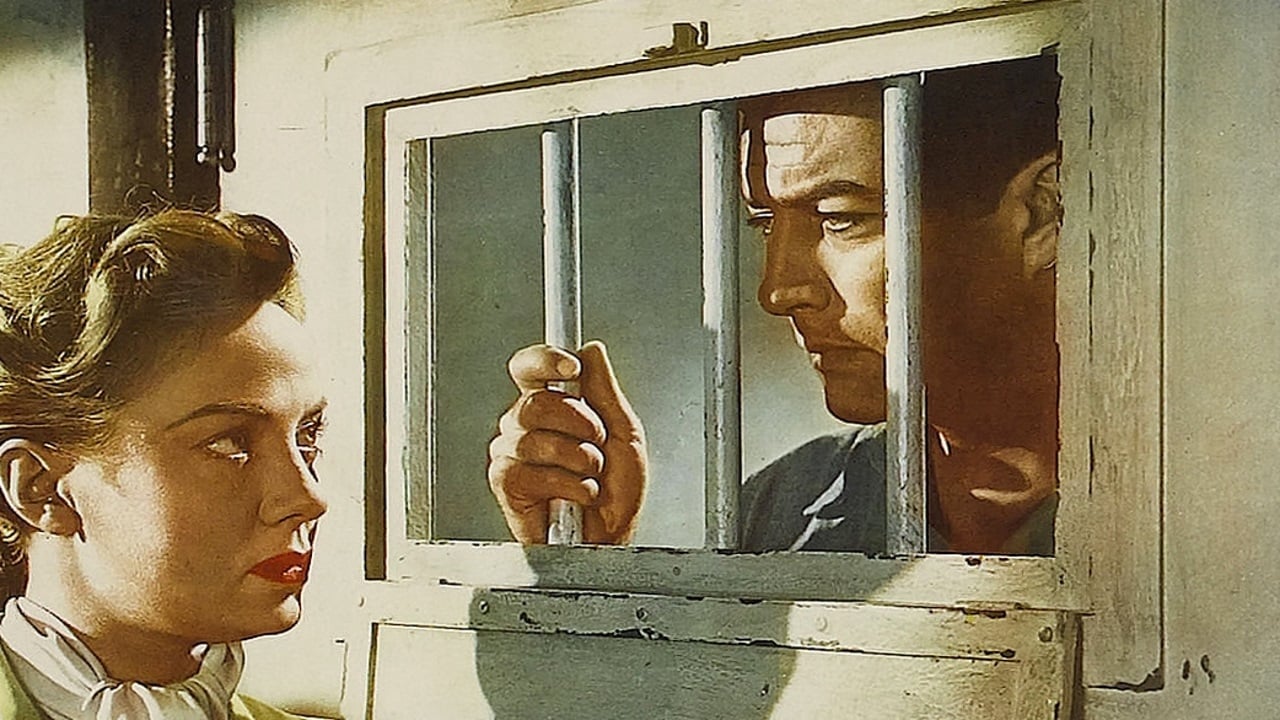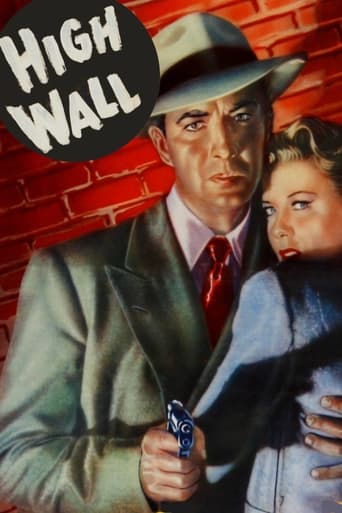GrimPrecise
I'll tell you why so serious
Matialth
Good concept, poorly executed.
2freensel
I saw this movie before reading any reviews, and I thought it was very funny. I was very surprised to see the overwhelmingly negative reviews this film received from critics.
Roxie
The thing I enjoyed most about the film is the fact that it doesn't shy away from being a super-sized-cliche;
vincentlynch-moonoi
This is a very interesting film, although it as one problem, Is it film noir? I'm not totally sure. To me it's just more of a mystery.Let's begin with the problem. Audrey Totter does fairly well here, but to there is a problem with her character. Would a female doctor in a mental hospital be that friendly and casual with a patient...particularly back in the late 1940s? I think not, although it's almost necessary to make the script work.This was a good film for Robert Taylor. Certainly different than his typical role. Here he plays a returning vet who discovers his wife apparently cheating on him. He strangles her...or does he? He is arrested and due to PTSD (of course that was not a recognized condition back then) placed in a mental institution for evaluation.Who might an alternate suspect be? Perhaps Herbert Marshall, the probable lover. A different role for Marshall, as well. I'm quite a fan of Marshall's, and this is not one of my favorite Marshall roles.I wasn't particularly pleased with how quickly the ending of the movie took place. However, this is a fine film and well worth watching. Recommended.
Robert J. Maxwell
Robert Taylor began his career at MGM in the 1930s and soldiered on for the next twenty years, never doing much but never getting in the way of the scenery. His default expression was a grim frown, sometimes inching its way towards bemusement. As he aged and his features coarsened, as they did after this movie, the studio simply gave up and cloaked him in armor or made him an outright sadist.Here, however, he rings the changes on his usual screen persona. He even grins. (Twice.) It may be one of his most nuanced performances. When he's introduced at the opening, driving the body of his strangled wife at a mad pace down the highway and then off into a ditch, he's shabby and his hair is all messed up. Thrice he's referred to as "a homicidal maniac." The film has him as a brain-injured amnesiac just returned from a long spell as a pilot in Burma. He finds his wife in a compromising position and just as he begins to strangle her, he passes out. Naturally, when the police find him and his wife's strangled body in a car, they arrest him but are forced to send him to a psychiatric hospital for tests -- under the tender ministrations of psychiatrist Audrey Totter.Surprise! He didn't do it. The murderer is the suave lawyer Herbert Marshall, with whom the wife was dawdling. It's complicated but it all works out at the end.It's been described as "noir" but it's unclear to me why. It's an ordinary B murder story that could have been sitting in a producer's drawer since 1935. The photography, though, by Paul Vogel, is dramatic, sometimes to the point of artsy, full of murky shadows, baby spots, and venetian blinds. For the most part, it's set bound. There are a few scenes of "dark sedans" racing through the rain but I can't recall a single scene that was shot on location in this unidentified city. It's all sets and back lots, and fortunately MGM had them all.The plot, alas, resembles a spaghetti colander, recently emptied but festooned with several pale strands, clinging relentlessly to the stainless steel. We know that poor Taylor was a bomber pilot in Europe and suffered a head wound, treated by surgery. That would account for his puzzling behavior and his spotty memory. But then he became a commercial pilot in Burma, cracked up, and suffered still ANOTHER brain injury which he has since refused treatment for. Well, one stove-in skull is enough for any man.Then, too, we know fairly soon that the debonair Herbert Marshall murdered the wife and framed Taylor. Okay. But WHY did he murder the wife. Absolutely no one asks -- not Taylor, not nobody. It isn't until the last few minutes that we discover Marshall's motive. Taylor's wife threatened to splash his name all over the media and ruin his promotion to partner at his law firm. We see it in a brief flashback. She suddenly begins to shriek and backs him up against the wall, practically begging to be murdered. The writers seem to have made up the motive at the last moment, knowing they must provide SOME springboard for the entire plot.It's not a terrible film. Taylor is better than usual and there is a fine supporting cast and some startling photography. But is suffers death by plot.
sol1218
**SPOILERS*** Robert Taylor as brain damaged ex bomber,in WWII, and cargo, in peacetime, pilot Steven Kenet is found with his wife Helen, Dorothy Patrick, at the bottom of a gully after he ran his car off the road in an attempt to kill himself. As for Helen she was found with her neck broken and was dead before the car hit the ground! With Kenet's memory of what happened the hours up to his wife's death gone the local D.A can't indite him in her murder. In that he has to prove that if in fact Kenet indeed murdered Helen he in having a server blood clot in his brain has no recollection of doing her in.The movie then back tracks in trying to find out what exactly happened between Kenet and his wife up until the time she was murdered! And does it with the help of Kenet's court appointed psychiatrist Dr. Ann Lorrison, Audrey Totter, who unknown to him is looking after his 10 year old son Dickie, Robert Hyatt,at her aunt's house. Locked up in a state mental intuition Kenet's confused mind slowly starts to remember what happened but only in bits and pieces. And that brings into the mix Helen's boss at the book publishing house where she worked Willard I. Whitcombe,Herbert Marshall. It was Whitcombe whom Helen was having a affair with while her husband was away overseas! Like the saying goes when the cat's, Kenet, away the mice, Helen & Whitcombe, will play and that's what was going on between the two when Kenet,with his damaged brain, was flying freight on cargo planes in Burma. It's when Kenet found out that Helen was cheating on him he blew a fuse as well as an electrical circuit or connection in his brain and completely blacked out! That's when he was about to ring Helen's neck!It's when Kenet grudgingly agrees to go under Narcosywtitesis, a fancy word for truth serum, that the truth suddenly comes out in what really happened just before he blacked out with his hands around Helen's neck. It in fact exonerated Kenet in her murder but got the man who murdered her to go right into action. It was Helen's killer who was tipped off and blackmailed by the building janitor Henry Cornner, Vince Barnett, who he also ended up murdering to shut him up! This had him get the very emotional and excited Kenet to trip himself up by going completely bananas at the sate mental intuition! Now a declared and certified, by the hospital staff, homicidal maniac after attacking and almost killing Helen's killer who came to visit and provoke him at the insane asylum Kenet is locked away for life in a padded cell.***SPOILERS*** It's Dr. Lorrison who not only believed that Kenet isn't his wife's killer as well has having fallen in love with the tall dark and handsome schlub who finally sets the record straight in Kenet's direction. But in doing it Dr. Lorrison not only risked her career as a doctor and psychiatrist but her life as well! Fuzzy and confusing movie about the workings of the human mind in the case of Steven Kenet's very mixed up confused as well as damaged up brain. One of the many films released after WWII with so many GI's coming back from the war with severe mental and emotional problems that tried to explain to the audience the theories of mental illness. And for the most part confused its audience even more about this very serious subject then they already were!
cengelm
I'm only commenting on this movie because of it's high ratings(7.6). The whole psychiatric story is unbelievable. Brain surgery does not have a certain outcome and in this case certainly wasn't indicated. Truth serum did not exist in 1947 and isn't invented yet. And if it existed why would really anyone bother to do serious investigations. Just let us make an appointment with all suspects and apply the serum. The motivations of the real murder don't seem sufficient. The plot often jumps from one scene to the next without the expected connection. After the janitor blackmails the murder we know it's over with him. I haven't seen any other movie with Robert Taylor so it may be that this is his best performance. By today's standards this is not more than4 / 10.

